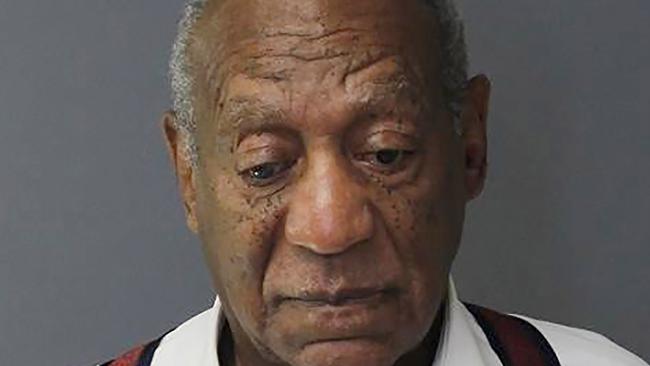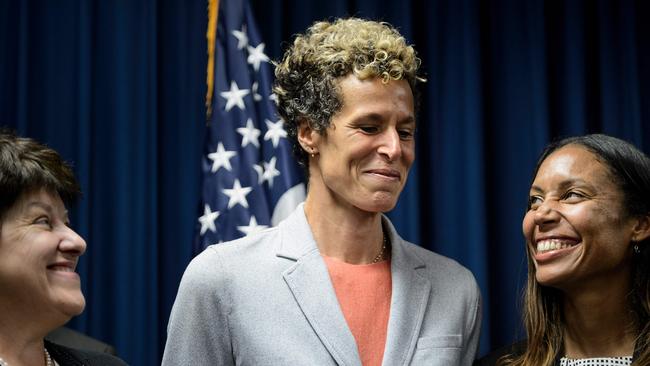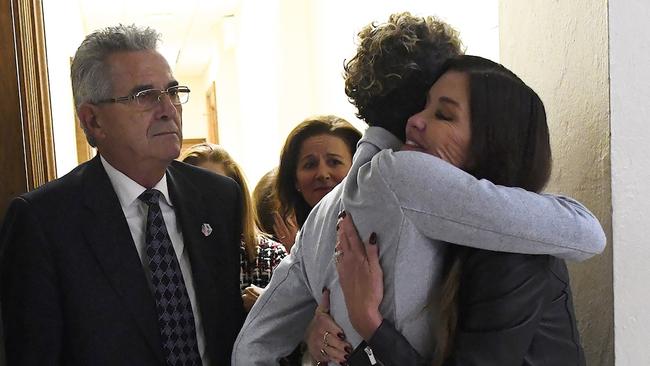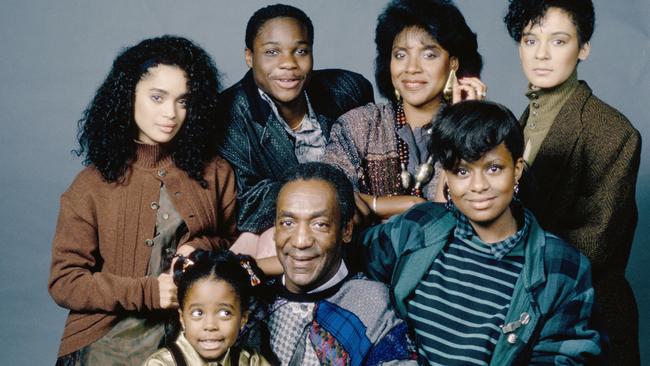Actor Bill Cosby not laughing now after his sentencing to 3 years’ jail
The serial predatory behaviour of TV comic actor Bill Cosby sealed his fate but the #MeToo movement will claim his scalp.

Bill Cosby has fallen so far for so long that it shouldn’t have been a surprise to see him finally in handcuffs yesterday.
Yet the image of the shackled 81-year-old shuffling towards jail for at least three years and possibly for the rest of his life was so compelling that it dominated news in the US, pushing out President Donald Trump’s address to the UN and Brett Kavanaugh’s troubled Supreme Court nomination.
Here was Cosby, the former TV megastar, finally stripped of the power and privilege he has enjoyed most of his adult life — a status he used to serially prey on unsuspecting women.
Instead, the old man who left Montgomery County Court of Common Pleas in Pennsylvania yesterday was reduced to a “sexually violent predator” and “a danger to the community”, in the words of judge Steven O’Neill.
“It is time for justice. Mr Cosby, this has all circled back to you,” O’Neill said. “The time has come.”
Cosby did not react when the sentence of three to 10 years in jail was handed down, but the same cannot be said for some of the 60-odd women who say he abused them and were in court to watch his downfall.
“Here’s the last laugh, pal,” former model Janice Dickinson hissed to Cosby in the courtroom.
“For decades, the defendant has been able to hide his true self and hide his crimes using his fame and fortune. He’s hidden behind a character he created, Dr Cliff Huxtable,” Montgomery County district attorney Kevin Steele said, referring to Cosby’s character in the hit TV series The Cosby Show.

“Now, finally, Bill Cosby has been unmasked, and we have seen the real man as he is headed off to prison.”
Victim Andrea Constand smiled as the sentence was read out. In a statement, she accused the former star once dubbed “America’s Dad” of having taken her “beautiful, young spirit and crushed it”.
“When the sexual assault happened, I was a young woman brimming with confidence and looking forward to a future bright with possibilities,” Constand wrote.
“Now, almost 15 years later, I’m a middle-aged woman who’s been stuck in a holding pattern for most of her adult life, unable to heal fully or to move forward. We may never know the full extent of his double life as a sexual predator, but his decades-long reign of terror as a serial rapist is over.”
With his sentencing, Cosby becomes the first celebrity of the #MeToo era to be imprisoned.
It comes at a time when the US is divided over the power and influence of #MeToo amid concerns that the movement — born of genuine concerns about better protection of women — is being co-opted for cyclical political ends.
The greatest weakness of #MeToo is its lack of subtlety in distinguishing between horrific serial male predators such as the Harvey Weinsteins and the Cosbys and unverified claims based on hearsay that seek to tear down lives. Consider the contrast between Cosby and Trump’s Supreme Court nominee, Kavanaugh. Kavanaugh, 53, is fighting for his reputation and his nomination because of two claims of sexual misconduct against him that are riddled with holes and lapsed memories of events that are more than 30 years old.
Christine Blasey Ford alleges that at a party in the early 1980s, when she was 15 and Kavanaugh was 17, he corralled her into a room and briefly placed his hand over her mouth while trying to undress her. She says a friend of Kavanaugh’s jumped on them, causing them to tumble over and she escaped.

Kavanaugh says he was never at the party and the alleged friend, Mark Judge, denies such any event took place. There are no other witnesses.
Ford never reported this to police and didn’t mention it to anyone until she was in therapy in 2011. Ford, a registered Democratic voter, then did nothing further while Kavanaugh was serving as a judge on the district court.
But when Kavanaugh was nominated for the Supreme Court — an appointment that would tilt the ideological balance of the court towards conservatives for a generation — Ford suddenly decided it was her “civic duty” to speak out after 36 years.
The second accusation against Kavanaugh is even more dubious. Deborah Ramirez, who attended Yale University at the same time as Kavanaugh in the early 1980s, claims she went to a college party with a then 18-year-old Kavanaugh and that he exposed himself to her and thrust his penis in her face, causing her to push it away.
Ramirez admits her memories contain gaps because she had been drinking heavily and that she was initially reluctant to say with certainty that the person in question was Kavanaugh.
Again Ramirez, another registered Democrat, never said anything to anybody. Her best friend at the time says she had never heard about the incident.
“After six days of carefully assessing her memories and consulting with her attorney, Ramirez said that she felt confident enough of her recollections to say that she remembers Kavanaugh had exposed himself,” The New Yorker wrote.
According to the magazine, Ramirez said she was playing a drinking game at the party to the point where she was on the floor, foggy and slurring her words.
Trump said yesterday: “The second accuser has nothing. The second accuser thinks maybe it could have been him, maybe not. She admits she was drunk. She admits time lapses.”
Kavanaugh says these are “smears, pure and simple. And they debase our public discourse. But they are also a threat to any man or woman who wishes to serve our country. Such grotesque and obvious character assassination — if allowed to succeed — will dissuade competent and good people of all political persuasions from service.”
The Democrats, in their haste to reject Kavanaugh from the Supreme Court, have recruited the #MeToo campaign for their benefit. Knowing they can never prove the three-decade-old claims of Ford and Ramirez, they have tried to harness the power of the movement to sway public opinion.
The factual basis of the assault claims against Kavanaugh have been largely lost in the partisan appropriation of claims by the Republicans and the Democrats.
The case of Cosby is a clearer example of the impact of the #MeToo movement and the ability of courts to eventually overcome the power and wealth of someone who believes they were above the law.
Cosby was an untouchable celebrity a decade ago. He was a pioneering African-American comic actor who starred in The Cosby Show as a daggy, funny but moralistic patriarch of an upper-middle-class family.

Americans had never seen such a character on television, and during the 80s and 90s it spent five years as the country’s top show.
Hollywood fawned over Cosby while a generation of black comedians saw him as a mentor.
In early 2004, Constand was a 30-year-old staff member for the women’s basketball team at Temple University in Philadelphia when Cosby invited her to his home to discuss her career. Cosby, 36 years her senior, poured her a glass of wine and produced three blue pills, which he described as “three friends” to “take the edge off” her anxiety. Constand, who is gay, said that within 30 minutes of taking the pills, her legs became “rubbery like jelly” and her body became “frozen” and “paralysed”.
“I felt Mr Cosby’s hand,” she said, “groping my breasts under my shirt. I also felt his hand inside my vagina moving in and out and I felt him take my hand and place it on his penis and move it back and forth.” She said she tried to stop him but her body was paralysed by the drugs.
When she sued Cosby in a civil trial it sparked a steady flow of other women who claimed to have suffered a similar assault. Cosby’s fans refused to admit it and the actor dismissed the claims. Yet as the number of accusers grew, Cosby’s supporters melted away.
Although more than 60 women eventually accused Cosby of assaulting them, Constand was one of the few whose allegations were recent enough to not be beyond the statute of limitations, meaning she could bring charges where others could not.
Cosby’s initial trial last year resulted in a hung jury but his retrial coincided with the rise of the #MeToo movement.
Yesterday Cosby’s spokesman, Andrew Wyatt, lashed out at the circumstances of his client’s conviction, claiming Cosby was subjected to the “most racist and sexist trial in the history of the United States”.
Wyatt claimed all three of the psychologists who testified against Cosby were “white women who make money off of accusing black men of being sexual predators”.
But Wyatt’s attempt to spark a OJ Simpson-style debate about race and justice fell on deaf ears. The court of US public opinion has long come down against Cosby.
As he walked stiffly in handcuffs towards the police car that would take him to jail yesterday, he must have wondered whether he would ever see freedom again.
He is legally blind and walks with a cane. He has had helpers around him day and night for a long, long time. Suddenly Cosby finds himself in a cell with no power and no recourse to any advantage over the common criminal in the cell next to him.
For the #MeToo movement it is their first big scalp.
But for every Cosby and Weinstein in the age of #MeToo, there is a Kavanaugh.
Cameron Stewart is also US contributor for Sky News Australia.

